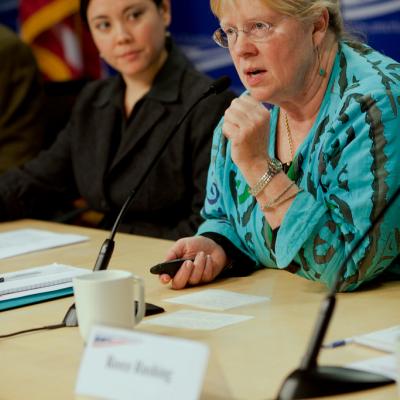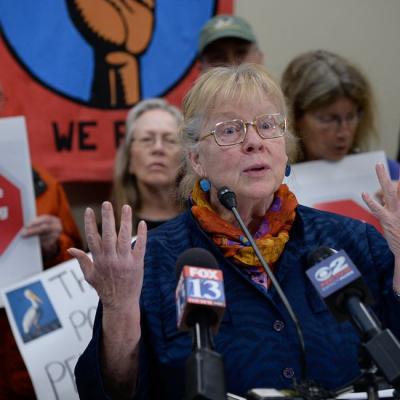Political Engagement
Many scholars hope to use their work to improve certain aspects of society, a pursuit that may take several different forms. Some, for example, seek to research and publish work studying previously-ignored issues or propose ideas that go against widespread assumptions and existing literature. Others may use their expertise to get involved in important social causes. Each of these paths present potential dangers for their careers and reputations, especially for female scholars. Regardless, these women and others find it important to remain politically engaged in their academic pursuits.
In the words of one graduate student, "pushed to the margins, forced to take risks, situated in politically and emotionally vulnerable positions, rendered illegitimate by the structure, the challenges in pursuing scholar-activist work are real. Also real, however, are the new possibilities in uniting scholarship and activism".
Because research is such an important activity in academia, scholar-activists face unique challengs and difficult choices regarding how to conduct their research, what topics to research, how to present that research, and how they will be received by other scholars, academic institutions, and policy-makers. As Suzuki and Mayorga recount in an article published by Multicultural Perspectives,
"Doing cultural political economy has...meant that I am explicitly deciding to be marginal within education studies because activist research is often not palatable for policy makers and mainstream researchers. I am trying not to compromise my work, but the flawed propping up of 'science-based research' as the legitimate, objective, facts forces me to think about how to make my work accessible, culturally relevant, and compelling to move researchers, policy makers, educators and community advocates to act."
Dr. Lisa Diamond discusses another issue with publishing research, which is the lack of control you as a scientist have over the ultimate application of that work once it is in the public domain. She discovered that her research was being used to support reparative therapies for homosexuality, which is not an approach that her research supports and is, in fact, a misuse of her research, as she recounts below.
Other scholars go beyond using their research to engage in important issues. This may take many forms such as joining and becoming involved in activist groups. Edwin Mayorga, while a graduate student at The City University of New York described the following trepidations after joining an activist group:
"It did cross my mind that participating in this group might affect my ability to access an academic position in the future. Would an academic institution find out that I was out there on a picket line and feel that I was not hirable? Would my ability to access certain funding sources be inhibited? How would this then impact the economic and emotional situations my family would be put in?"
Kirtly Parker Jones, PhD has also used her expertise to take political action. As a physician, she had to learn how to navigate intersections between political activitiy and her clinical practice.
"I think you have to be careful that your personal perspective, whatever that might be, doesn't overrule the agency of your patient. So, if I have patients have particular religious concerns about doing X or Y, I don't bring my own personal perspective on that. As long as it's not illegal, I'm happy to help them try to achieve what they can. I think when it comes to personal public health… So, I’m currently on the board of Utah Physicians for a Healthy Environment- UPHE- and I think we have to speak out for public health, because sometimes people who make the laws aren't terribly well informed about public health. They aren't necessarily aware of the most recent science about- particularly about issues in terms of air pollution, water pollution, radon, lead… They often, in our state, tend to favor industry, and I tend to favor- I think a bigger look at what’s sustainable and what's healthy.
So, I think it's important, having testified in Congress at the national level about pollutants in the environment...and particularly industrial pollutants that have an adverse effect on fertility and pregnancy, and done also here, so I think it's important. I think a couple of the national organizations that have done some really important work about speaking up against nuclear testing.
So, I'd say yes. Gun violence is a great one. I mean, if I were a pediatrician, I would be speaking out... for gun laws that actually restrict children's access to guns because there's an epidemic of deaths in children, and I mean under 18-year-olds from gun violence. And it's usually kids, you know, just playing with guns, or it's kids shooting each other. This is just awful, and I think you should speak up about that." -Kirtly Parker Jones, PhD
Jones has spoken out about and been heavily involved in many important issues. This includes seeking action from Utah elected officials to mitigate the harmful effects of air pollution as a board member of the Utah Physicians for a Healthy Environment. Dr. Jones also spent part of her career as Medical Director of Planned Parenthood and published an editorial on the importance of Title X, which provides federal funding for family planning and reproductive health services for underserved populations.
"There were three of us who were coming on board at Planned Parenthood Utah at the same time and it was a time when there was, unfortunately, a lot of shake-up in terms of...how funding from the federal government was going to support Planned Parenthood institutions and some legal issues where the states said you couldn't use public funds—state funds—to provide contraception to minors without parental consent.
And there had been this umbrella grant that came to the states called Title X that provided funding for underserved women and men as they made their families, and it turns out that Title X says adolescents are underserved women... Confidentiality is a big part of family planning, so Title X funds, the states said we couldn't have them and then we sued. So Kirtly, and mostly Planned Parenthood, sued Ronald Reagan and DHHS over where the funding was going and we won." -Kirtly Parker Jones, PhD
The place of activism and political engagement in academia remains a challenging question for many scholars and the ways in which they choose to do so may vary widely by the individual, research field, and academic institutions.
However, as Mayorga argues, "much of the research literature and conversations I had been exposed to [in academia] were explicitly divorced from action," creating a disconnect between "scholarship and activism [which I believe] are inextricably linked."
Page written and researched by Abigayle Kendall, Kaylee Martin, Rachel Nelson, and Eva Quintus-Bosz.
Later edited by Pamalatera C. Fenn


